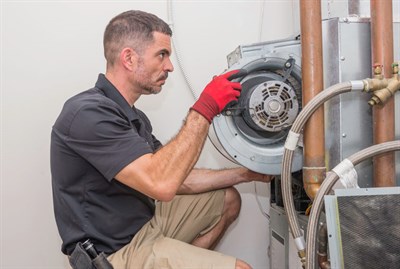
Which Type of Furnace is Best for You?
Regardless of where you live, chances are you have a furnace in your home or office building. Furnaces are one of the largest components of your HVAC system. They’re responsible for keeping you warm and toasty whenever the weather is chilly.
Furnaces aren’t a one-size-fits-all solution. There are many different types of furnaces to choose from. In this article, we’ll discuss the most common furnace types, as well as their pros and cons, to help you pick the best furnace for your needs.
The furnace’s blower forces the warm air out of your vents, heating your space. As the warm air circulates, cold air makes its way back to the furnace where it, in turn, is heated up and recirculated.
Electric furnaces contain heating elements, much like an oven, that transfer heat to the air before it is circulated through the system. Electric furnaces are fairly compact, making them the ideal solution for smaller spaces. While they tend to be less expensive than other furnace types, they also tend to be less efficient. That said, they can be the right choice for many people given they can last up to 10 years or longer if well cared for.
 Oil furnaces are often found in the northeastern U.S. Though they aren’t quite as efficient as gas furnaces, they can last up to twice as long with proper maintenance. Gas furnace owners must purchase tanks of oil, which then have to be stored until they are ready to use.
Oil furnaces are often found in the northeastern U.S. Though they aren’t quite as efficient as gas furnaces, they can last up to twice as long with proper maintenance. Gas furnace owners must purchase tanks of oil, which then have to be stored until they are ready to use.
They work by drawing the oil into a burner chamber and igniting it, creating heat. Unfortunately, this means oil furnace owners must regularly work to clean ash and soot buildup to prevent the system from clogging or malfunctioning.
Gas furnaces are one of the most common types of furnaces used in the United States. Buried pipelines pump natural gas to homes and businesses, which is ignited inside the furnace to generate heat. Gas furnaces are notoriously reliable, efficient, and cheap to run, assuming the price of fuel is low. This makes them an ideal choice for many applications, assuming the building in question has access to a municipal gas line.
Propane furnaces are very similar to gas furnaces in terms of how they function. The only major difference is they are fueled by propane tanks instead of gas lines. They’re often used for homes and businesses located in very rural areas where oil, gas, or electricity may not be readily available. Additionally, propane furnaces are roughly as efficient as gas furnaces and compact enough to fit in smaller spaces.
Furnaces aren’t a one-size-fits-all solution. There are many different types of furnaces to choose from. In this article, we’ll discuss the most common furnace types, as well as their pros and cons, to help you pick the best furnace for your needs.
How Do Furnaces Work?
While the way the heat is generated depends on the type of furnace you have, furnaces generally work by heating and circulating air around your home or office. When the temperature in your home or commercial space drops below the temperature set on the thermostat, the system kicks on and begins heating and circulating air.The furnace’s blower forces the warm air out of your vents, heating your space. As the warm air circulates, cold air makes its way back to the furnace where it, in turn, is heated up and recirculated.
Common Types of Furnaces
Nearly all furnaces fall into one of the following four categories: electric, oil, gas, and propane. Each one of these types works slightly differently to keep homes and buildings warm.Electric furnaces contain heating elements, much like an oven, that transfer heat to the air before it is circulated through the system. Electric furnaces are fairly compact, making them the ideal solution for smaller spaces. While they tend to be less expensive than other furnace types, they also tend to be less efficient. That said, they can be the right choice for many people given they can last up to 10 years or longer if well cared for.
 Oil furnaces are often found in the northeastern U.S. Though they aren’t quite as efficient as gas furnaces, they can last up to twice as long with proper maintenance. Gas furnace owners must purchase tanks of oil, which then have to be stored until they are ready to use.
Oil furnaces are often found in the northeastern U.S. Though they aren’t quite as efficient as gas furnaces, they can last up to twice as long with proper maintenance. Gas furnace owners must purchase tanks of oil, which then have to be stored until they are ready to use.They work by drawing the oil into a burner chamber and igniting it, creating heat. Unfortunately, this means oil furnace owners must regularly work to clean ash and soot buildup to prevent the system from clogging or malfunctioning.
Gas furnaces are one of the most common types of furnaces used in the United States. Buried pipelines pump natural gas to homes and businesses, which is ignited inside the furnace to generate heat. Gas furnaces are notoriously reliable, efficient, and cheap to run, assuming the price of fuel is low. This makes them an ideal choice for many applications, assuming the building in question has access to a municipal gas line.
Propane furnaces are very similar to gas furnaces in terms of how they function. The only major difference is they are fueled by propane tanks instead of gas lines. They’re often used for homes and businesses located in very rural areas where oil, gas, or electricity may not be readily available. Additionally, propane furnaces are roughly as efficient as gas furnaces and compact enough to fit in smaller spaces.

